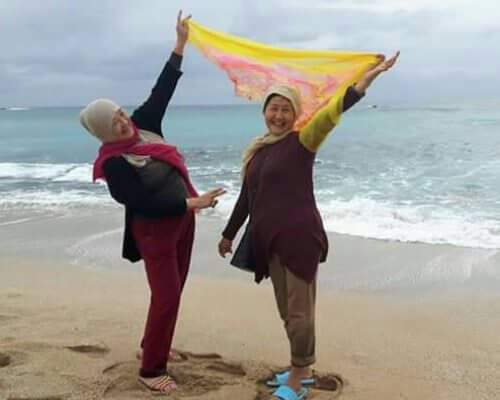Wearing different clothes such as turban and hijab, Muslims are mysterious for most of the people whose understanding might be influenced by the news or movies. Even though the worldwide Muslim population has reached 1.7 billion, Taiwan residents still seem out of touch with it as something of the distant Middle East.

Despite a difference in religion and lifestyle, a Muslim couple quietly moved to Taitung, dedicating themselves to everything here. As Amir Habib Shaikh stated, “The kids here in Taitung are adorable, so we decided to move here to help them to our best capacity!”
Amir Habib Shaikh has spent over fifteen years living in Taiwan. Before getting married to his Taiwanese wife, he was doing business related to electronic components procurement.However, after their marriage and traveling back and forth between Pakistan and Taiwan, they ended up deciding to live in northern Taiwan. Upon a family trip to Taitung, the serenity and gorgeous scenery left them with a great impression. The encounter and interaction with the indigenous children in the tribal villages made them decide to move to Taitung – the garden of Taiwan. Besides enjoying the serene life here, Amir Habib Shaikh continuing to teach English to the children in the tribal villages has been a huge appeal for him.
The Muslim population in Taitung is low, as the diet and lifestyle are incredibly different from most of the people. “We have to follow Salah every day and are forbidden to eat pork or drink alcohol. These are the basic rules to follow as a Muslim,” explained Amir Habib Shaikh. After moving from Taipei to Taitung, a friend in Taipei suggested that he should prepare some meals suitable for Muslim tourists traveling in Taitung as there weren’t any restaurants in Taitung possessing the Halal Certification(1).He heard that most Muslim tourists bring eggs or ration bars to eat while visiting Taitung.
While starting to prepare lunch boxes catered towards Muslims, tourists gradually became more familiar with their establishment. People recommended that they open a Muslim restaurant with a Muslim Prayer Room. “For every Muslim, a mosque is like a home providing a feeling of peace for performing Salah,” said Amir Habib Shaik.
There are lots of churches and temples in Taitung; however, there aren’t any mosques, which is a disadvantage for popularizing Muslim tourism in Taitung. Therefore, they opened a restaurant on Provincial Highway No.9 that sells Halal food. Muslim tourists can travel around Taitung without worrying about their diet as they can enjoy the local Halal cuisine.
In addition to taking care of the children in remote tribal villages, Amir Habib Shaikh and his wife wish to build a platform for selling Halal certified products from Taitung to the halal market – a market which is worth one hundred billion US dollars. Setting up this platform will allow Islamic countries in the Middle East and South-east Asia to see the high quality products of Taitung.

Amir Habib Shaikh considers Taitung to be warm and hospitable city. In fact, he has many Muslim friends who would like to live here but are deterred because Taitung lacks a mosque. Unlike performing Salah which can easily be done at home, most Muslim tourists are unable to let their soul find peace without a mosque – decreasing their willingness to visit Taitung. “If a unique mosque was built along the beautiful East coast in Taiwan, it would definitely boost the tourism in Taitung!” said Amir Habib Shaikh with excitement in his eyes. He hopes that by making improvements to the hospitality industry of Taitung, it will create a new wave of Muslim tourists and allow Muslim from around the world to experience the warmth and friendliness of Taitung.
(1)Halal Certification is the recognition that the certified products adhere to Islamic law. These products are thus permissible for eating, drinking or using by Muslims. For products that are consumed or touched by Muslim, it is necessary to trace the source, ranging from raw material to product handling. This includes factory facilities, manufacturing machinery, packaging, storage, logistics, and even the retail stores – all of these must be consistent with the doctrine.(From: https://asean.thenewslens.com/article/69733)




